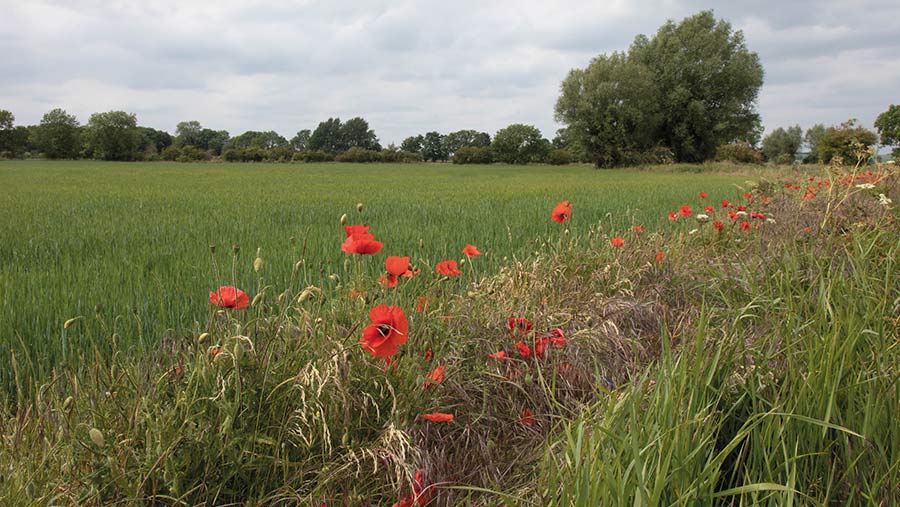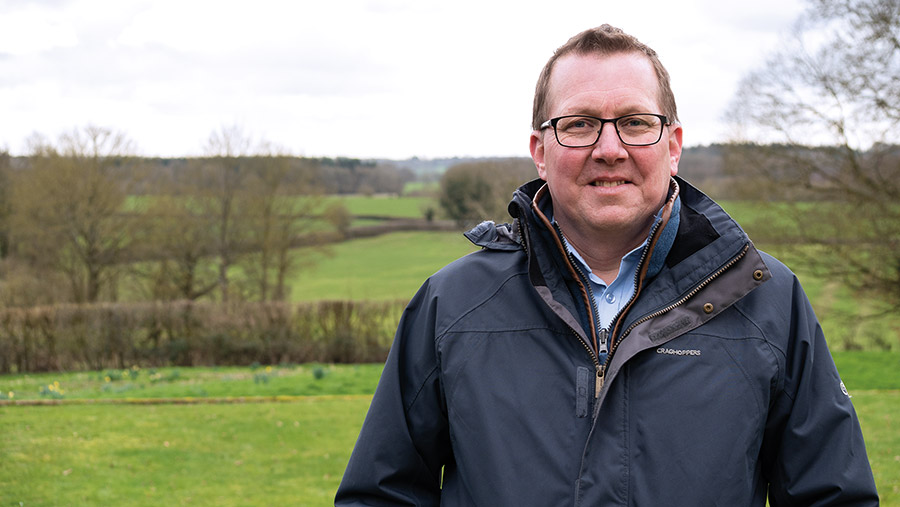Hants grower focuses on sustainable farming as support fades
 © Tim Scrivener
© Tim Scrivener Hampshire farm manager Andy Bason is looking to improve his sustainable farming practices with a focus on soil health in preparation for the ending of direct farm subsidies.
He is planting trees, running wild flower strips through fields, trying out new crops, widening his oilseed rape rotation, and is keen to do more on his farm near Winchester.
That’s why he was chosen as one of four farmers in a Resilient and Ready programme organised by sustainable farming group Linking Environment and Farming (Leaf) and agrochemicals and seeds giant Corteva Agriscience.
See also: Greening farms prepare for radical switch in farm policy
Mr Bason is keen to be well prepared with direct subsidies from the Basic Payment Scheme (BPS) being phased out and a big focus of environmental schemes under a “public money for public good” mantra.
“With BPS ending, we want to be ahead of the game and protect the farm’s profitability,” he says.
He has been farm manager for 10 years and already uses variable rates of fertilisers and seeds on the farm, which includes 70ha of woodland and a small sheep flock and pig herd.

Andy Bason at Newhouse Farm
Planning ahead
Mr Bason is eager to discover more about wildlife and diversity on the farm, and look to improve habitats and the environment. Here, he summarises the four things he is looking to get out the three-year schemes:
- Improving soils
Soil management has been at the forefront of his mind with a switch to minimal tillage over the past two decades, but he is keen to learn more. Arable cropping makes up 600ha of the 800ha Newhouse Farm, Alresford, just a few miles north-east of Winchester. Soils are predominantly light chalk soils, but with clay caps, and he would like to manage them better. - Wider rotation
A one-in-four year oilseed rape rotation where the crop followed a run of spring beans, spring barley and winter wheat was deemed too tight. This year, canary seed is being grown, and next year it will be winter linseed, as oilseed rape is cut from 150ha to 80ha this season and probably to 60ha next season. The farm is also looking to reduce the usage of nitrogen fertiliser, so fertility-building cover crops have been introduced. - More people
Mr Bason is missing the involvement of being an AHDB Monitor Farm some three years ago, as well as the interaction with school children and fellow farmers. “There’s a huge demand from the public to know more about what happens on a farm and so we are looking to help out,” he says. - Integrated farming
He is keen to integrate the arable cropping and environmental practices on the farm, which have often seemed like two separate businesses. The farm has a mid-tier environment scheme running to 2022, so he would like to know how he should be approaching the start of the new Environmental Land Management (ELM) schemes starting from 2014.
Support sustainability
Simon Parker, marketing manager at Corteva, says the group wants to support farmers with advice and training, and adapt its products towards sustainable farming.
“We are looking to gain insights into sustainable farming and how our products and services fit into that model,” he says.
Leaf consultant Alice Midmer says farmers are particularly interested in soil and biodiversity, so they will take an integrated approach looking at the biological side of soil management but also the use of chemical solutions.
“Chemistry does have a role in sustainable farming if used in the right way,” she says.
The four farms joining the three-year Resilient and Ready programme are:
- Andy Bason, Newhouse Farm, Alresford, Hampshire
- Ben Lowe and Harriet Ross, Newseat of Dumbreck Farm, Udny, Aberdeenshire
- Craig and Claire Grant, Kindrought, Fraserburgh, Aberdeenshire
- Nick Down, Yattendon Estate, Yattendon, Berkshire

